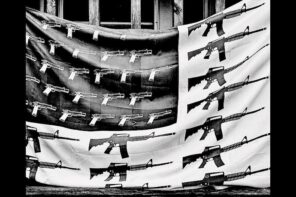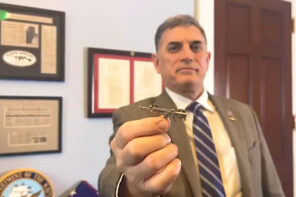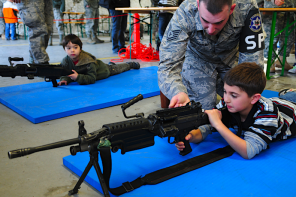Years ago a mother told me a story about her young son who liked to play cowboys and church, his very own role-playing game. One day she overheard him reenacting Jesus summoning Lazarus from the tomb; the little boy, toy gun in each hand, shouted, “Lazarus, come out with your hands up.”
As a childhood game, the story is funny. As a child’s portrait of the Christian religion, however, the story is troublesome. How do you move from the image of Jesus of Nazareth as “the Prince of Peace,” who taught his followers to be peacemakers and instructed one of his disciples to put away his sword rather than violently attack his enemies, to a portrait of Jesus holding a gun in each hand as threatening enhancement to his demand for obedience? A similar image would be problematic if it pictured Moses poised for a vicious attack on people to whom he was yelling “Shalom,” or of the prophet Mohammed as he waved a sword while explaining he comes in peace. The same principle applies to portraits of Buddha or Nanak, the founder of Sikhism.
Well, this week, Louisiana Governor Bobby Jindal joined a few other governors who have signed into law what’s being called a “gun in church” bill. The Louisiana version refers specifically to churches, synagogues, and mosques, though I assume the law applies also to temples, shrines, gurdwaras, and other houses of worship.
Something is wrong with this picture and I think most of us know what it is.
Frankly, despite frequently infusing his civic rhetoric with the language of faith, Jindal, like others, shows a surprising lack of knowledge about the essence of faith and priorities of faithfullness. Why would civic leaders not want one of the last institutions devoted to peace-making to continue that important work in a society addicted to violence and fascinated by guns? Of course, anytime government becomes involved in religion, we should expect distortions and problems that can compromise its integrity. The founders of our nation knew the reality of that development well and sought to prevent it. It’s a crying shame that contemporary leaders have either forgotten or chosen to ignore it.
Interestingly, the Louisiana law entrusts the decision about allowing concealed weapons in houses of worship to the leader of each respective house of worship, assuming a religious hierarchy in every congregation—which is often not the case.
Though in the church I pastor the congregation is responsible for the leadership, I could not help but wonder why I would want to choose certain people in the church to carry guns; or perhaps, take advantage of the new law for myself by tucking away a little handgun in my clerical robe like a pocket Bible. Would that be a way to prevent the man in the second row from sleeping through the Sunday sermon; or to quiet the older woman who always raises an irrelevant question in church business meetings; or to make teenagers a little uneasy about playing video games during the choral anthem; or to increase the success of a congregation-wide financial campaign?
But, no, the matter is a serious one having to do with what happens in the sacred space designated for worship, amid the peaceful spirit of a faith that wants to change the world, not bend to society’s lowest standards for resolving problems.
Yes, I understand the violent environment in which some worship centers are located. One time in the past, I had a bottle rocket shot at me while I was delivering a sermon in a pulpit. Such an occurrence is frightening. But that is not a reason to replace peace-making with gun-toting. Why, even in the old shoot’em up West, cowboys and cowgirls respectfully checked their guns at the door of a house of worship. Not even Texas allows guns in houses of worship!
Keep in mind, though, that Bobby Jindal does not see the importance of treating a house of worship any differently than a university, a business, or a civic auditorium (recall his defense for using taxpayers’ dollars to fly around Louisiana giving his Christian testimony exclusively in evangelical churches). Little wonder that he would fail to see a difference between carrying concealed weapons to a church and to a civil protest. But, thankfully, no government leader gets the right to determine the sanctity of a place of worship and what happens there.
To the State Legislature of Louisiana and to Governor Bobby Jindal, as a Christian in that state I must say, “thanks, but no thanks.”
This very day I wrote to members of the leadership council in the congregation in which I serve, urging that we prohibit concealed and unconcealed weapons in a place designated for worship by people committed to nonviolence. It’s a decision the congregation will be forced to make because of the government once again intruding in its business. Enough already!




